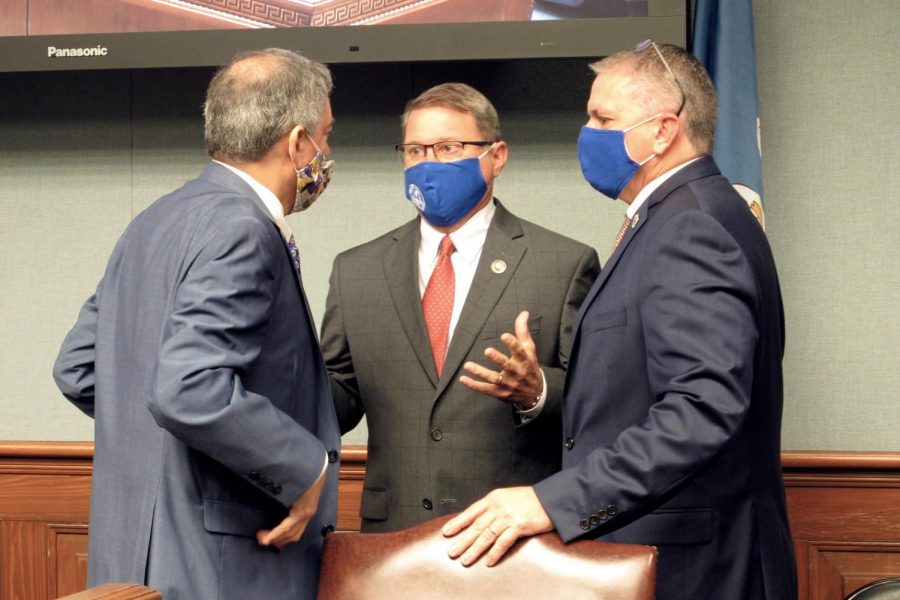COVID-19 legislative session started Monday in Louisiana
Senate President Page Cortez, R-Lafayette, center, gestures as he talks with Commissioner of Administration Jay Dardenne, left, the governor’s chief budget adviser, and House Speaker Clay Schexnayder, R-Gonzales, right, on Friday, Sept. 25, 2020, in Baton Rouge, La. The three men, all members of the Revenue Estimating Conference, spoke ahead of the conference’s meeting. (AP Photo/Melinda Deslatte) Photo credit: Associated Press
October 3, 2020
BATON ROUGE, La. (AP) — Only three months removed from their last gathering, Louisiana legislators return Monday for a special session focused on the coronavirus outbreak, with deepening rifts between Gov. John Bel Edwards and Republican lawmakers over the appropriate response to the pandemic.
The month-long special session was called by Republican lawmakers without consultation from the Democratic governor, who had no sway over the 70-item agenda.
On the agenda are everything from Hurricane Laura response and changes to coronavirus regulations to budget discussions and issues specific to individual parishes, prompting criticism the list is too expansive.
“It’s like a regular session. I think the call is way too ambitious,” said Baton Rouge Rep. Ted James, one of the few Democrats to sign the petition convening the session. “I think that there’s no way that we can adequately address all of those issues in 30 days.”
The House and Senate convene Monday evening, with little action expected on the opening day besides procedural moves of reading in bills and assigning them to committee.
Top of the agenda is a push by GOP legislators, particularly in the House, to try to scale back the governor’s emergency powers and require more review from the Legislature for emergencies that last beyond a few weeks.
Though lawmakers are proposing a permanent change for all governors, the immediate effect would limit Edwards’ ability to keep coronavirus-related business and activity restrictions in place without agreement from lawmakers — many of whom complain they’ve been sidelined.
“I think there’s a large segment of the Legislature that wants to at least have a seat at the table to discuss how the state operates,” said Senate President Page Cortez, a Lafayette Republican.
Democrats are rallying against efforts to curb the governor’s authority, and if they hold together as a bloc in the House, they could keep Republicans from being able to override an Edwards veto of such legislation.
“The governor is doing a good job of managing the pandemic,” said Shreveport Rep. Sam Jenkins, the leader of House Democrats.
Nearly 5,300 people in Louisiana have died from the COVID-19 disease caused by the coronavirus since mid-March, according to the state health department.
Some Republican lawmakers say Edwards’ continued regulations have been an overreaction, damaging the state’s economy.
The governor says his rules — which were loosened earlier this month — are less restrictive than many other states with lower rates of virus infections. The White House coronavirus task force and Trump administration officials have repeatedly applauded Edwards’ handling of the outbreak.
Cortez said one of his main priorities for the session involves finding a way to shore up the state’s nearly bankrupt unemployment trust fund. Jobless benefits will keep flowing to workers through loans from the federal government, but in 2021 those benefits will shrink and businesses will
have to pay higher taxes if lawmakers can’t find a state financing stream to refill the trust fund.
Sen. Cameron Henry, a Metairie Republican, wants to start looking at ways to cut state spending to account
for lower tax collections because of the coronavirus outbreak. While federal dollars have filled budget gaps this year, those dollars will disappear next year. Henry wants to prepare for that loss — and he’s suggesting lawmakers curtail future automatic salary hikes for state workers.
“To be borrowing money for uneployment while giving out pay raises is not the best use of taxpayer dollars,” he said.
Henry and other Republicans lawmakers also want to take a deep dive into the government contracts that have been awarded during the pandemic and after Laura struck in
August, as public bid laws have been suspended because of the governor’s emergency orders.
Edwards has criticized the special session as too long and too unwieldy in topics.
Special sessions traditionally have cost Louisiana about $50,000 a day, meaning this latest gathering could cost as much as $1.5 million if it lasts until it must end Oct. 27.







